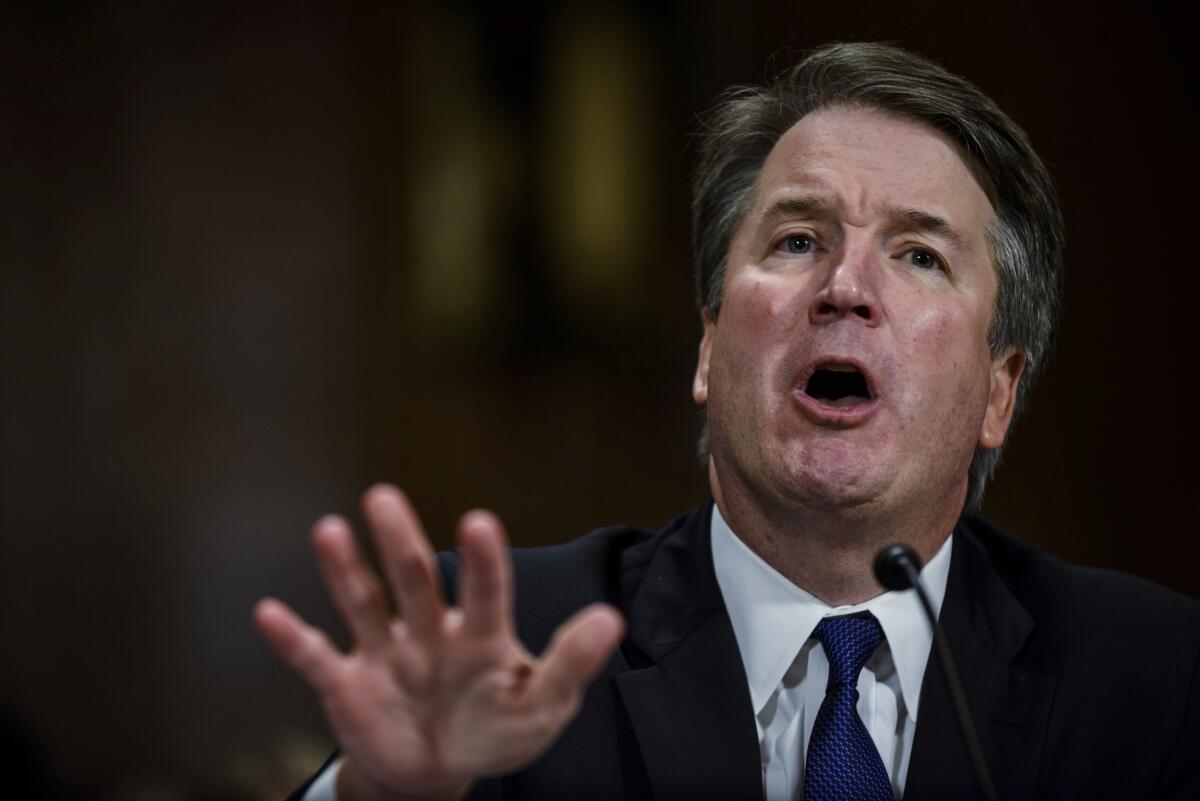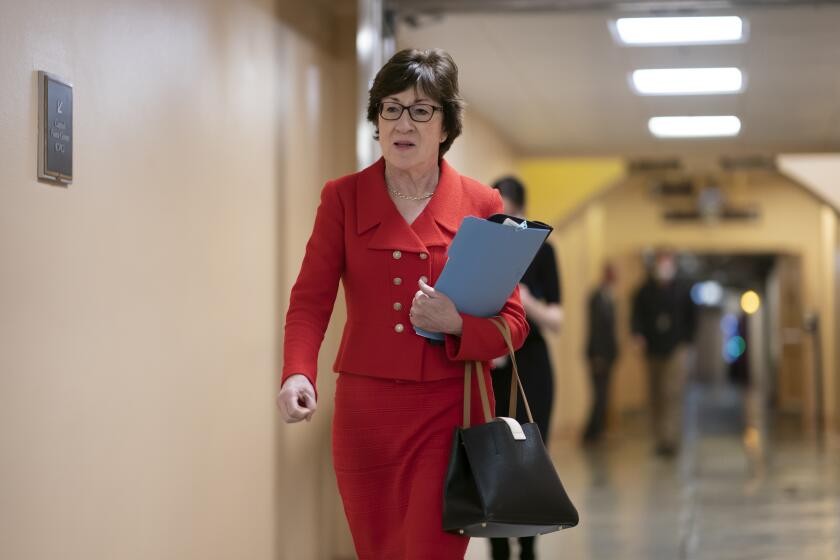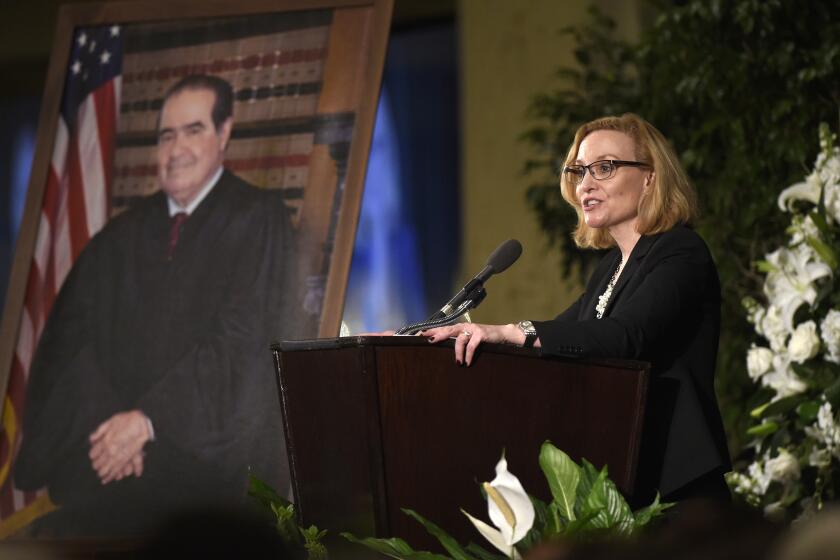Column: Brett Kavanaugh’s Roe vote proved it again — he has a truth problem

- Share via
Brett Kavanaugh is a serial liar.
It’s jarring to write that about anyone, let alone a life-tenured justice on the Supreme Court. Yet years of evidence throughout Kavanaugh’s career show it’s a fact.
And that fact, together with recent years’ confirmation controversies and Clarence Thomas’ ethical lapses, is central to understanding why public confidence in the court has dropped precipitously. And that was before the last week’s string of unpopular, precedent-defying decisions against abortion, gun controls and the wall between church and state.
Opinion Columnist
Jackie Calmes
Jackie Calmes brings a critical eye to the national political scene. She has decades of experience covering the White House and Congress.
Worse for Kavanaugh, the criticism of his credibility is bipartisan. In the latest blow, Maine Sen. Susan Collins, a fellow Republican whose vote was decisive when the Senate confirmed Kavanaugh four years ago, has doubled-down on her contention that he “misled” her when he reassured her that, if confirmed, he would not support overturning the court’s half-century-old abortion rights precedent, Roe vs. Wade.
The ever-cautious Collins would never say “lie.” Yet the New York Times obtained proof of just that, clearly from the senator’s office, publishing “contemporaneous notes” kept by those who sat in on Collins’ private meeting with then-nominee Kavanaugh in 2018. According to the notes, Collins pressed him hard about Roe.
Kavanaugh told her: “Start with my record, my respect for precedent, my belief that it is rooted in the Constitution, and my commitment and its importance to the rule of law. I understand precedent and I understand the importance of overturning it.”
“Roe is 45 years old, it has been reaffirmed many times, lots of people care about it a great deal, and I’ve tried to demonstrate I understand real-world consequences,” he said, and then added, “I am a don’t-rock-the-boat kind of judge.”
Now, hearing that, wouldn’t you believe that Kavanaugh would vote to uphold Roe?
Sen. Collins calls ‘absurd’ the RNC resolution defending the insurrectionists as ‘ordinary citizens.’ But she is reluctant to truly stand up to Trump.
The credulous Collins did, or claimed to. People in both parties, however, those who are pro-abortion rights and anti-, did not believe him. Nor did I. That had much to do with his record as a mendacious political operative.
Kavanaugh’s credibility was widely in doubt long before the he-said, she-said allegations of sexual assault that convulsed the country during his Supreme Court confirmation hearings and nearly killed his nomination. He denied the credible accusations of an assault in high school from Christine Blasey Ford and two reported attacks at Yale, one alleged by classmate Debbie Ramirez and another that Senate Republicans bottled up, for which there was a reputable eyewitness. And Kavanaugh also denied that he ever was a blackout drunk, though numerous Yale classmates came forward to attest, under oath, that he was.
In Washington after law school, Kavanaugh quickly became familiar to Democrats as the partisan protégé of Kenneth Starr, the independent counsel who investigated Bill and Hillary Clinton in the 1990s. Investigators’ documents from that time, now at the National Archives, show Kavanaugh sought evidence that Clinton aide Vince Foster was murdered — pandering to conspiracists on the right — years after he told colleagues that he believed Foster had committed suicide, just as prior investigations had concluded. Kavanaugh also was widely suspected of leaking anti-Clinton information from a grand jury, though he denied it.
When his next boss, then-President George W. Bush, nominated Kavanaugh to the prestigious D.C. Court of Appeals in 2003, Democratic senators blocked his confirmation for three years, until 2006. They were convinced he lied to them during the confirmation process by denying involvement in several White House controversies: policies allowing warrantless surveillance after Sept. 11 and the torture of terrorism suspects, and the selection and promotion of Bush’s most right-wing judicial nominees.
Roe vs. Wade went from ‘settled’ law to overruled in a few years, thanks to four unexpected developments.
Kavanaugh also denied any complicity in a Senate scandal — “Memogate” — involving a Republican aide who’d surreptitiously copied thousands of Democrats’ emails from 2001 through 2003 and shared them with Bush advisors.
Democrats had no proof to the contrary in the mid-aughts, but at the time of Kavanaugh’s Supreme Court confirmation hearing in 2018, they got some. Republicans, then the Senate majority, grudgingly released Bush White House emails that contradicted Kavanaugh on his role in the controversies he’d been asked about in the prior decade.
Most damning were the Memogate emails: Many of the emails forwarding Democrats’ purloined messages listed Kavanaugh as a recipient, often the only one. Yet in 2004, when Democratic Sen. Charles E. Schumer asked Kavanaugh whether he‘d received “memos from internal files of any Democratic members,” Kavanaugh under oath said, “No.” Another time, he testified, “I’m not aware of the memos.”
Confronted with contrary evidence in 2018, Kavanaugh conceded receiving the emails but said he’d figured the Republican Senate aide got them from Democrats in the normal give-and-take among staffers.
As if.
What Democratic aide would provide a Republican staffer with the specific questions that Democratic Sen. Patrick J. Leahy planned to ask a Republican judicial nominee at a hearing? Or a 4,000-word Democratic strategy memo? Or an email containing damaging information about a Republican nominee marked for Democrats only? (On the last one, Kavanaugh replied to the Republican aide within minutes, giving him rebuttal talking points for GOP senators.)
Democrats made clear Tuesday that the confirmation hearing for Brett Kavanaugh, President Trump’s Supreme Court nominee, will not go quickly or smoothly, though the chances of blocking his appointment in the GOP-led Senate remain slim.
Still Kavanaugh testified that the messages never raised “red flags” about their provenance. “Judge, I was born at night,” an exasperated Leahy snapped, “but not last night.”
After Kavanaugh’s confirmation to the Supreme Court, Chief Justice John G. Roberts Jr. sent scores of ethics complaints about him from lawyers, law professors and others to an appeals court council for review. Most were about his alleged lying under oath. The council soon dismissed them as moot: While the allegations were “serious,” the council said, justices aren’t subject to judicial ethics rules.
And that helps explain how liars end up on the nation’s highest court, for life, to determine how the rest of us live our lives.
More to Read
Get the latest from Jackie Calmes
Commentary on politics and more from award-winning opinion columnist.
You may occasionally receive promotional content from the Los Angeles Times.














